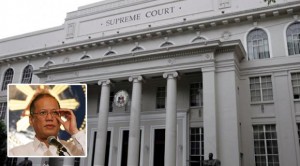Petitioners’ retort to Palace on DAP issue: We are taxpayers
MANILA, Philippines – As taxpayers, they have every right to complain.
Petitioners who won the Supreme Court’s favor in questioning the controversial Disbursement Acceleration Program reasserted on Saturday their right to bring the case to court after Malacañang challenged their standing in seeking a reversal of the court’s ruling on Friday.
“Petitioners are taxpayers. Public funds were juggled and used for questionable projects such as extra pork we have for lawmakers,” said Renato Reyes, secretary-general of the militant umbrella group Bagong Alyansang Makabayan (Bayan), which was one of the nine petitioners that questioned the constitutionality of what the Palace claims was an economic stimulus program.
“We have every reason to assail DAP and demand accountability. Nagpapalusot na naman ang Palasyo [The Palace is trying to get out of the issue again],” Reyes said.
Malacañang on Friday appealed the Supreme Court’s unanimous July 1 ruling that struck down DAP as unconstitutional for violating budget regulations, particularly the cross-border transfer of savings to other agencies and projects outside the approved General Appropriations Act.
In its appeal, it asserted that DAP was undertaken in good faith, and asked the court anew to dismiss the petitions lodged against the program for lack of merit. It said the case was “not justiciable” as the petitioners had “neither been injured nor threatened with injury as a result of DAP.”
But for lawyer Harry Roque, another petitioner, questioning DAP in court was an exercise of a public right.
“I’m a taxpayer and [was] injured by illegal expenditure of public funds. I’m also a citizen with a standing to enforce a public right: to ensure the President does not violate the Constitution,” said Roque.
Dante Jimenez, founding president of petitioner Volunteers Against Crime and Corruption, expressed disappointment over the Palace’s argument and found it discriminatory.
“We petitioners are among his (President’s) ‘bosses.’ That was a very discriminating statement. [The Palace] is in a panicky stage,” Jimenez said.
In its 13-0 ruling, the Supreme Court said Malacañang must prove in the proper tribunals that it had implemented the program in good faith, implying the possible criminal, civil and administrative liability of “authors, proponents and implementors” of the discretionary fund augmentation program.
In separate opinions, several justices said the President had encroached on Congress’ exclusive power of the purse and that Budget Secretary Florencio Abad may have consciously worked around the government’s appropriations rules in implementing DAP.
In its appeal, Malacañang said the high court itself had undertaken a cross-border transfer of savings in 2012 and attempted to do so again in 2013.
The Palace said the utilization of funds under DAP has been “dismishing” over the last three years: “from P75.1 billion in 2011, P53.2 billion in 2012, to P16 billion in 2013.”
“This belies the claim that there was intent to accumulate savings so that the President may use them for discretionary spending. Even before the various present petitions were filed, DAP had already become operationally dead,” said the Palace.
Several groups, including the VACC and Bayan, are moving for the President’s impeachment over the DAP issue.
RELATED STORIES
‘SC ruling on DAP: Checks, balances, democracy work’
SC declares parts of DAP unconstitutional
